A lot of atheists and humanists today are pretty much allergic to religious language and ritual. But John Dewey, writing in the 1930s, was coming from a very different place.
Few people can claim a greater influence on American culture than the philosopher John Dewey (1859–1952). In the course of a long career, Dewey practically reinvented the American system of education from the bottom up.
Dewey was also a key figure in the rebirth of modern humanism. But his approach was controversial, even among humanists — partly because he wanted to keep using the word God, even though he didn’t believe such a being existed.
For some atheists and humanists, such reminders of religion bring up too many bad memories or resentments. Others don’t want to be assumed to be religious, an assumption that makes them disappear into the mainstream and reinforces the idea that atheists are rare.
Though an atheist himself, Dewey wasn’t allergic to religion. In fact, he worried aloud that there was a growing “crisis in religion” as increasing knowledge of the world made it harder for people to be religious.
Are you wondering why an atheist wanted people to keep believing in God? Well he didn’t, really. Like Felix Adler in the 19th century, Dewey said he wanted to rescue the religious impulse, to keep religious language and ritual, even if people no longer believed in God.
This may seem strange at first, but it’s very similar to Unitarian Universalism (UU) today. Religion, he said, is a way to gather in community, to focus on ideals, and to take positive action together. You wouldn’t want to lose that just because God is off the clock.
But Dewey went even further than most UUs when he said to keep using the word God, but mean something else — not a supernatural being, but community, ideals, whatever it was that made people want to strive to be their best. That, he said, is “God.”
This designation is a big problem for a lot of people, religious and atheist alike, even today. If someone thinks the supernatural God is an important idea to preserve, they want to know that when someone says “God,” she means God. And if someone thinks belief in a supernatural God is a harmful thing, it doesn’t help when the very word is redefined to mean pretty much anything.
Not long after Dewey proposed this redefinition, the United States entered the Cold War, religion became entwined with patriotism, and God was added to the currency and the Pledge of Allegiance. If “God” has been redefined to mean anything a person wants it to mean, arguing that church-state lines have been crossed becomes very difficult. And then were atheists not patriotic?
With or without religious language, Dewey’s ideas profoundly influenced modern humanism and liberal religion, including Ethical Culture and Unitarian Universalism.





